| << Chapter < Page | Chapter >> Page > |
Free expression includes the right to assemble peaceably and the right to petition government officials. This right even extends to members of groups whose views most people find abhorrent, such as American Nazis and the vehemently anti-gay
Westboro Baptist Church , whose members have become known for their protests at the funerals of U.S. soldiers who have died fighting in the war on terror (
[link] ).

Rallies and protests on land that has other dedicated uses, such as roads and highways, can be limited to groups that have secured a permit in advance, and those organizing large gatherings may be required to give sufficient notice so government authorities can ensure there is enough security available. However, any such regulation must be viewpoint-neutral; the government may not treat one group differently than another because of its opinions or beliefs. For example, the government can’t permit a rally by a group that favors a government policy but forbid opponents from staging a similar rally. Finally, there have been controversial situations in which government agencies have established free-speech zones for protesters during political conventions, presidential visits, and international meetings in areas that are arguably selected to minimize their public audience or to ensure that the subjects of the protests do not have to encounter the protesters.
Since 2011, as part of the White House website, the Obama administration has included a dedicated system, “We the People: Your Voice in our Government,” for people to make petitions that will be reviewed by administration officials.
There has been increased conflict over the Second Amendment in recent years due to school shootings and gun violence. As a result, gun rights have become a highly charged political issue. The text of the Second Amendment is among the shortest of those included in the Constitution:
“A well regulated Militia, being necessary to the security of a free State, the right of the people to keep and bear Arms, shall not be infringed.”
But the relative simplicity of its text has not kept it from controversy; arguably, the Second Amendment has become controversial in large part because of its text. Is this amendment merely a protection of the right of the states to organize and arm a “well regulated militia” for civil defense, or is it a protection of a “right of the people” as a whole to individually bear arms?

Notification Switch
Would you like to follow the 'American government' conversation and receive update notifications?